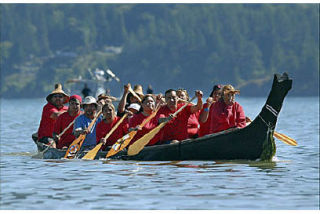Lummi, Nooksack, Samish, Suquamish, Swinomish and Tulalip canoes arrive in the San Juans en route to Duncan, B.C. this week. Traditionally, when canoes entered a Tribe’s or Nation’s territory, paddle tips were pointed upward to signify a peaceful entry, “We Come In Peace!” As part of the 2008 Canoe Journey, canoes will stop at Shaw Island on July 24 and Roche Harbor on July 25.
The Canoe Family Welcome Dinner will be held on Wednesday, July 23 at 7 p.m. at Shaw Park.
The Canoe Journey is a cultural connection like no other. It is a time of healing, hope, happiness, honor and hospitality. The yearly journey began in 1989 with nine canoes as the Paddle to Seattle. The event sparked new interest in learning and living the coastal culture among the Washington tribes, many of whom had not practiced Canoe Society traditions for a number of years.
At each stop along the Canoe Journey, the public can watch the colorful, soulful arrival of the canoes. Colorful, because each canoe and paddle is an elaborately carved work of art; and soulful, because many of the canoe families keep time to songs, which often come to them on the water.
On the shore, in keeping with tradition, canoe families ask permission‚ often in their own languages‚ to enter and leave each territory by announcing who they are, where they come from and that they come in peace.
Relationships are strengthened, family ties are renewed and young and old gather together during this drug- and alcohol-free event. “Our Elders believe that through canoe-pulling, we achieve perfect harmony and balance,” says cultural docent Shannon Eastman of the Samish Nation. “All our traditions are based on respect. Respect for our elders, for others, for all our relations as well as for our environment. As such, we have a code of conduct that must be adhered to by all participants in order for everyone to enjoy a safe, warm and welcoming event.”
Samish Tribal archeologist Sarah Johnson explained the importance of the annual summer gathering‚ a canoe trip and potlatch where members of all of the Coastal Indian Nations in Washington and British Columbia meet up in a central location. “It is especially important for our young adult members to connect with their ancestry,” she said. Johnson, her sister Michelle Johnson, and friend Rose Castilleja have participated for the last few years. “Sometimes it’s hard to get the time off work but I think it is really important to take part,” said Castilleja.
This year’s trip began in Squaxin in the south sound with three canoes and will end with over 60 canoes from around the region in the territory of the Cowichan First Nation, which is hosting the 2008 North American Indigenous Games Aug. 3 to 8. Over 5,000 athletes from 25 teams and 3,000 cultural artisans and performers are expected to participate in the largest event of its kind in North America.
There will be a free community dinner to welcome the families at Indian Cove (Shaw County Park) on Shaw Island on Wednesday, July 23 at 7 p.m. Food is being hosted by The Kitchen Garden Company of Shaw Island.
On Thursday, July 24, the canoe families arrive at Roche Harbor for a day of rest before crossing the Strait of Juan de Fuca to Vancouver Island on Saturday. A welcoming dinner hosted by the San Juan Visitors Bureau, Soroptomists and the Whale Museum will be held at the Roche Harbor marina at 7 p.m.
“It’s an honor for the San Juan islands to be the site of the only non-native stopovers on this year’s Journey,” said Stephanie Buffum-Field of the Friends of the San Juans, who has been coordinating the local welcoming events.
Sponsors of the event include Roche Harbor Resort and Marina, San Juan Visitors Bureau/Scenic Byways Committee, Portals Group, Bison Gallery, University of Washington Friday Harbor Labs, Marine Resources Committee, Soroptimist, The Whale Museum, Doug Bison Gallery, San Juan Initiative, Northwest Straits Commission, Shaw Store, and Kitchen Garden. This is an alcohol-free event.
Volunteers are needed; call Stephanie Buffum-Field of Friends of the San Juans, 378-2319.



